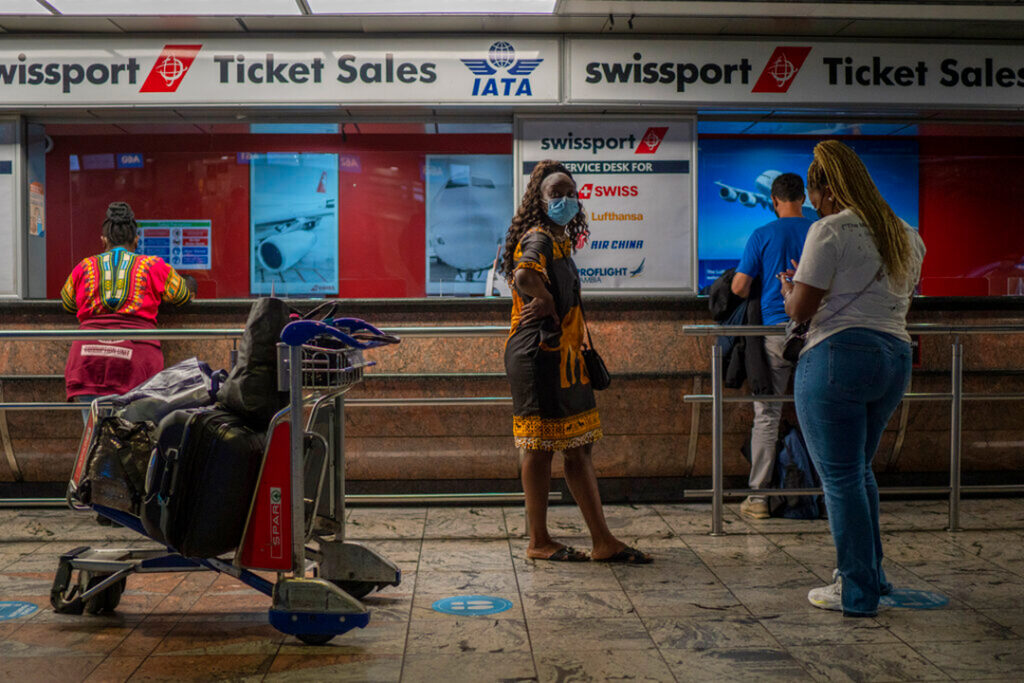ADF STAFF
It was no coincidence that South African President Cyril Ramaphosa had just boarded an airplane when he delivered a forceful rejection of recent COVID-19-related travel bans.
His country was the first to alert the world to a new strain called omicron on November 24. Within two days, several countries closed their borders to travelers from Southern Africa.
“We have come out in total rejection of these bans that have been imposed on Southern Africa, and we are insisting that they be lifted,” Ramaphosa said to reporters on November 30 before departing for a tour of Côte d’Ivoire, Ghana, Nigeria and Senegal.
“The least we expected was to be punished by various countries about what we have disclosed very transparently. We do not contain a virus through imposing bans unscientifically and indiscriminately.”
The fear surrounding omicron is understandable because preliminary data suggests it is more contagious than the dominant delta strain that triggered resurgent waves of COVID-19 cases around the world.
Countries said the bans are necessary until more is known about omicron’s transmissibility and its severity. A study by WZB Berlin Science Center that looked at data from 181 countries found that for bans to be effective they must target specific countries or areas of concern and be put in place in the very early stages of an outbreak. Still, the study found, bans lose their effectiveness over time.
While acknowledging the utility of some early pandemic border lockdowns, scientists such as South African epidemiologist Salim Abdool Karim note that the arrival of COVID-19 was merely delayed by such measures.
“The virus has spread before we even knew it existed,” he told television network PBS on December 2. “What’s at issue here is that even if it [a travel ban] has an impact, even if it has some benefit, it will be so small and so short-lived that it’s really not worth implementing.”
The World Health Organization (WHO) has warned that targeted travel restrictions hurt economies and discourage the reporting of new viruses or variants. Officials also said countries in Southern Africa have been unable to transport biological samples that could help researchers abroad learn about and fight omicron.
Most experts say the latest round of border closures were too late to do anything but buy time. But they point to a host of other measures that are proven to reduce the spread of COVID-19:
- Increased testing at airports and border crossings.
- Supervised or institutional quarantine for anyone coming from a country known to have omicron cases.
- Mask mandates.
- Higher domestic restriction levels that limit public gatherings and reduce capacity of markets, restaurants and shops.
- Improved indoor ventilation systems.
- Renewed emphasis on hand-washing and social distancing.
Another important countermeasure is a national surveillance system to trace viruses and mutations — something Southern Africa had in place before the pandemic because of experiences with HIV, Ebola and tuberculosis.
WHO spokesperson Dr. Margaret Harris said it’s important for countries that put travel restrictions in place to “make the most of that time.”
“Build up your hospital capacity,” she told radio network NPR. “Build up your tracking and tracing. Build up your surveillance. Prepare.”
Ramaphosa agreed.
He said that countries should have confidence in established countermeasures rather than fear, panic and targeted travel bans.
“We have advanced as a world to a point where we now know that when people travel, they should be tested like I was tested last night, and I’m happy to be tested when I arrive again,” he said. “We’ve got the tools. We’ve got the means to be able to deal with this.”

